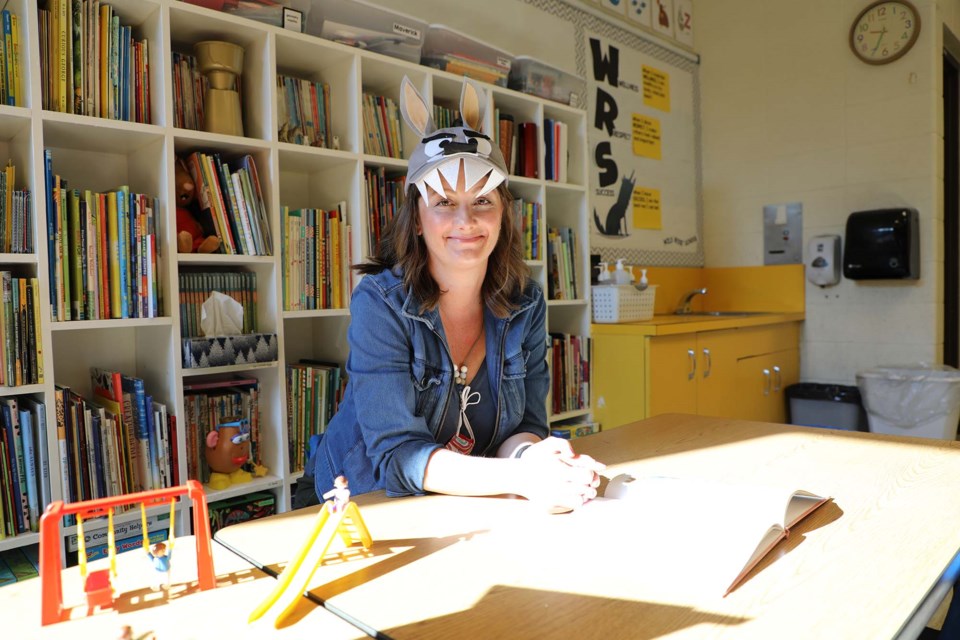Back-to-school can be a stressful time for parents, particularly for parents of kindergarten-bound children.
Wild Rose Elementary School kindergarten teacher, Amy Bautista, has some recommendations for parents who are looking to ease back-to-school jitters, be it their child’s jitters or their own.
Bautista only recently started teaching full-day kindergarten, but she has been a teacher for more than 20 years. One of the biggest things she has found parents can do for their kids is to be excited about school.
“I hope what parents are telling their kids is that school is awesome … something we know about kids, is that they very much absorb and reflect the things that they hear and see at home,” she said.
Bautista noted there are a few things parents can do that will help with the transition into school. One of those things is helping a child be independent.
“So, working with your kids on zippers and buttons and Velcro shoes; how to ask for help, if they don't know something; … opening snacks; feeding themselves; those sorts of things — all those independent skills are really helpful as they're going into an environment where more than one person needs something at the same time,” she said.
Another thing that is helpful for parents to do is to re-establish routine, said Bautista. This can be done around routines for sleep, such as reading a story every night, or by having family dinners.
“(Families need to create) some real consistency because kindergarten is a big change, and that big change can be well supported … Let's do some of those things we haven't had a chance to do (during the summer), so getting back into those regular sleep, eat, schedules are really a big deal,” she said.
Another area that parents always ask Bautista about is academics.
“I mean, the answer is children can arrive in kindergarten, with such a wide range of skills, what they can actually do coming into kindergarten is so much less important than their ability to be curious and to start to learn resilience when things don't go perfectly well or they don't figure it out right away,” she said.
Parents can sit down and practice alphabet and number skills, as well as do puzzles, read books, and solve problems, but Bautista recommends parents don’t always give kids the solution.
“Allow them to find their own solutions, because those are pre-academic skills that are going to make learning those academic skills so much easier, but also it feels better to learn those things independently and to know that you can make a mistake and it's okay,” she said.
Parents should expect their kindergarten kids to be worn out at the end of the day, and they may not be up to performing their usual, everyday tasks.
“It's because when things are new, they are thinking so hard all the time, and feeling so much all the time,” she said.
Kids may also have a honeymoon period when school is new, fun, and exciting and then all of a sudden it stops being exciting.
“I find it happens in two ways for little kids sometimes; they love school right away. And sometimes they need some encouragement to jump in,” she said.
Kids who have difficulties at the beginning usually have a fairly straight trajectory where they get more comfortable and it gets easier over time, said Bautista.
“But it does happen that kids can have a couple of weeks of, ‘School felt great,’ and then wake up one morning and say to their mom, ‘I don't want to go to school. Like, that was super fun and I'm so glad we did it and now I’m done,’ especially when they're little and they don't have the context of like there are 12 more years of this, right, this is my life,” she said.
Parents think something terrible must have happened after a child goes through this, especially if they loved school before, Bautista said, but it’s typical for kids to have to get over that hump. A child might tell their parents it’s because they never get to play with the blocks, but that might not necessarily be the case.
“I mean, maybe. But often, it's just a little blip in the radar that can solve itself with lots and lots of consistency and good communication with the teacher, so I think just to expect that September can be a bit unpredictable as kids, settle into that routine and learn to trust in your person, and learn to have those independent moments,” she said.
As for parents who are feeling anxious about leaving their children for the first time, Bautista recommends having a plan in place.
“Have a plan of things you're going to do so that you aren't sitting all day worrying about how things are going and also plan on some family rituals that really celebrate this time and also mark that time for your child and for you,” she said.
Bautista said her most confident kids walking in on the first day have the more confident parents — even if they aren’t feeling confident on the inside.
“It's hard. It's a huge change and especially for our kids that have lived through COVID, for some of them, they've been home for a long time,” she said.
Bautista said teachers have learned to keep their spaces as clean and healthy as possible and how to keep kids as clean and healthy as possible, too.
“I hope it helps to know that you're sending your most important thing to a person who knows that they are your most important thing, and just wants the best for them, too.”




